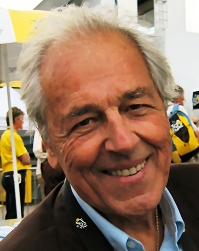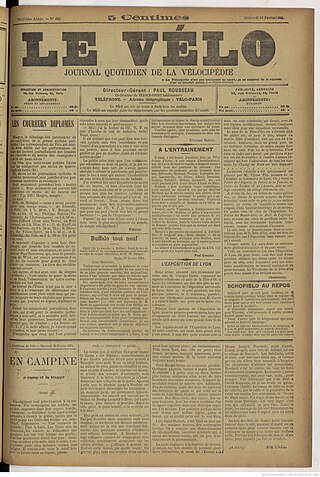
Raymond Poulidor, nicknamed "Pou-Pou", was a French professional racing cyclist, who rode for Mercier his entire career.

Angelo Fausto Coppi was an Italian cyclist, the dominant international cyclist of the years after the Second World War. His successes earned him the title Il Campionissimo. He was an all-round racing cyclist: he excelled in both climbing and time trialing, and was also a good sprinter. He won the Giro d'Italia five times, the Tour de France twice, and the World Championship in 1953. Other notable results include winning the Giro di Lombardia five times, the Milan–San Remo three times, as well as wins at Paris–Roubaix and La Flèche Wallonne and setting the hour record (45.798 km) in 1942.

Bernard Thévenet is a retired professional cyclist. His sporting career began with ACBB Paris. He is a two-time winner of the Tour de France and known for ending the reign of five-time Tour champion Eddy Merckx, though both feats are tarnished by Thévenet's later admission of steroids use during his career. He also won the Dauphiné Libéré in 1975 and 1976.

L'Équipe is a French nationwide daily newspaper devoted to sport, owned by Éditions Philippe Amaury. The paper is noted for coverage of association football, rugby, motorsport, and cycling. Its predecessor, L'Auto, was founded by wealthy conservative industrialists to undermine Le Velo, which they found too progressive. It was a general sports paper that also covered the auto racing which was gaining popularity at the turn of the twentieth century.

Marquis Jules Félix Philippe Albert de Dion de Wandonne was a French pioneer of the automobile industry. He invented a steam-powered car and used it to win the world's first auto race, but his vehicle was adjudged to be against the rules. He was a co-founder of De Dion-Bouton, the world's largest automobile manufacturer for a time, as well as the French sports newspaper L'Équipe.

Henri Desgrange was a French bicycle racer and sports journalist. He set twelve world track cycling records, including the hour record of 35.325 kilometres (21.950 mi) on 11 May 1893. He was the first organiser of the Tour de France.
The Grand Prix des Nations was an individual time trial for both professional and amateur racing cyclists. Held annually in Cannes, France, it was instituted in 1932 and often regarded as the unofficial time trial championship of the world and as a Classic cycle race. The race was the idea of a Parisian newspaper editor called Gaston Bénac. The beret-wearing sports editor was looking for a race to make a name for Paris-Soir, the biggest French evening paper before the war.

Jean Robic was a French road racing cyclist who won the 1947 Tour de France. Robic was a professional cyclist from 1943 to 1961. His diminutive stature and appearance was encapsulated in his nickname Biquet(Kid goat). For faster, gravity-assisted descents, he collected drinking bottles ballasted with lead or mercury at the summits of mountain climbs and "cols". After fracturing his skull in 1944 he always wore a trademark leather crash helmet.

Henri Pélissier was a French racing cyclist from Paris and champion of the 1923 Tour de France. In addition to his 29 career victories, he was known for his long-standing feud with Tour founder Henri Desgrange and for protesting against the conditions endured by riders in the early years of the Tour. He was killed by his lover with the gun that his wife had used to commit suicide.

Antoine Blondin was a French writer.

There have been allegations of doping in the Tour de France since the race began in 1903. Early Tour riders consumed alcohol and used ether, among other substances, as a means of dulling the pain of competing in endurance cycling. Riders began using substances as a means of increasing performance rather than dulling the senses, and organizing bodies such as the Tour and the International Cycling Union (UCI), as well as government bodies, enacted policies to combat the practice.
Géo Lefèvre (1877–1961) was a French sports journalist and the originator of the idea for the Tour de France.

Hippolyte Aucouturier was a French professional road bicycle racer. Aucouturier, a professional between 1900 and 1908, won two stages at the first Tour de France in 1903 and won three stages and finished second in the 1905 Tour de France. He also won Paris–Roubaix twice, in 1903 and 1904. His elder brother Francois was also a racing cyclist.
The Tour de France was not held because of World War II because the organisers refused German requests. Although a 1940 Tour de France had been announced earlier, the outbreak of the war made it impossible for it to be held. After that, some attempts were made by the Germans during the war to have a Tour de France to maintain the sense of normality, but l'Auto, the organising newspaper, refused. Some other races were run as a replacement.
Pierre Chany was a French cycling journalist. He covered the Tour de France 49 times and was for a long time the main cycling writer for the daily newspaper, L'Équipe.
René de Latour was a Franco-American sports journalist, race director of the Tour de l'Avenir cycle race, and correspondent of the British magazine, Sporting Cyclist, to which he contributed to 120 of the 131 issues.

Jacques Augendre is a French journalist and the first to have followed fifty Tours de France. Jacques Goddet covered 53 but from 1936 to 1986 he was also the race organiser. Pierre Chany would have been the first journalist to 50 Tours de France had he not died in 1996 within weeks of the start.

Le Vélo was the leading French sports newspaper from its inception on 1 December 1892 until it ceased publication in 1904. Mixing sports reporting with news and political comment, it achieved a circulation of 80,000 copies a day. Its use of sporting events as promotional tools led to the creation of the Paris–Roubaix cycle race in 1896, and the popularisation of the Bordeaux–Paris cycle race during the 1890s.
The 1946 Milan–San Remo was the 37th edition of the Milan–San Remo cycle race and was held on 19 March 1946. The race started in Milan and finished in San Remo. The race was won by Fausto Coppi of the Bianchi team. He attacked with nine others, five kilometres into a race of 292 km. He dropped the rest on the Turchino climb and won by 14 minutes.

Achille Germain was a French road and track cyclist.













